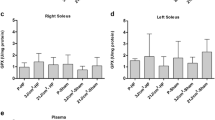Abstract
The aim of this study was to clarify the role of oxygen-derived free radicals and the effect of free radical scavengers on skeletal muscle ischemia/reperfusion injury. Male Wistar rats were divided into a complete ischemia group (C-group) and an incomplete ischemia group (IC-group) and each animal was subjected to 2h of ischemia and 1h of reperfusion. In an attempt to decrease reperfusion injury, the rats were given free radical scavengers either as allopurinol 50 mg/kg for 2 days or as superoxide dismutase 60,000 units/kg plus catalase 500,000 units/kg. Tissue malondialdehyde, a product of lipid peroxidation, was measured as an indicator of free radicals, with higher levels indicating higher concentrations of free radicals. The malondialdehyde level in the gastrocnemius muscle after 1h of reperfusion increased significantly in both groups when compared to the levels before and 2h after ischemia, although there was no significant difference between the two groups. The water content of the gastrocnemius muscle and serum creatinine phosphokinase MM isoenzyme (CPK-MM) in both groups, and GOT in the C-group, increased significantly after 1h of reperfusion when compared the values before and 2h after ischemia. In the C-group, these values were significantly higher than in the IC-group. The administration of free radical scavengers suppressed the increase in malondialdehyde in the gastrocnemius muscle after reperfusion in both groups. The increase in water content and CPK-MM after reperfusion was also suppressed by free radical scavengers in the IC-group, but not in the C-group. These findings suggest that ischemic damage predominates in complete severe ischemia/reperfusion injury, whereas reperfusion injury predominates in incomplete mild ischemia/reperfusion injury.
Similar content being viewed by others
References
McCord JM (1985) Oxygen-derived free radicals in postischemic tissue injury. N Engl J Med 312:159–163
Korthuis RJ, Granger DN, Townsley MI, Taylor AE (1989) Ischemia-reperfusion injury: Role of oxygen-derived free radicals. In: Taylor AE, Matalon S, Ward PA (eds) Physiology of oxygen radicals. American Physiological Society Bethesda, pp 217–249
Long JW Jr, Laster JL, Stevens RP, Corkins M, Silver WP, Silver D (1988) Postischemic reperfusion injury in skeletal muscle: Role of oxygen free radicals. Surg Forum 39:342–344
Eklof B, Neglen P, Thomson D (1981) Temporary incomplete ischemia of the legs induced by aortic clamping in man: Effects on central hemodynamics and skeletal muscle metabolism by adrenergic block. Ann Surg 193:89–98
Belkin M, Brown R, LaMorte WW, Hobson RW II (1988) Reperfusion injury in skeletal muscle: Myth or reality? Surg Forum 39:308–311
Fantini GA, Minei JP, Perry O, Shiono S, Shires GT (1987) Reperfusion with superoxide dismutase improves cellular membrane function in postischemic skeletal muscle. Surg Forum 38:317–319
Lee KR, Cronenwett JL, Shlafer M, Corpron C, Zelenock GB (1987) Effect of superoxide dismutase plus catalase on Ca2+ transport in ischemic and reperfused skeletal muscle. J Surg Res 42:24–32
Perry MO, Fantini G (1987) Ischemia: Profile of an enemy. Reperfusion injury of skeletal muscle. J Vasc Surg 6:231–234
Walker PM, Lindsay TF, Labbe R, Mickle DA, Romaschin AD (1987) Salvage of skeletal muscle with free radical scavengers. J Vasc Surg 5:68–75
Haljamae H, Hagberg H, Jennische E (1982) Cellular effects of complete tourniquet ischemia. In: Lewis DH (ed) Induced skeletal muscle ischemia in man. Karger, Basel, pp 33–48
Perry MO, Shires GT III, Albert SA (1984) Cellular changes with graded limb ischemia and reperfusion. J Vasc Surg 1:536–540
Roberts JP, Perry MO, Hariri RJ, Shires GT (1989) Incomplete recovery of muscle cell function following partial but not complete ischemia. Circ Shock 17:253–258
Yokota J, Minei JP, Fantani GA, Shires GT (1989) Role of leukocytes in reperfusion injury of skeletal muscle after partial ischemia. Am J Physiol 257 (Heart Circ Physiol 26):1068–1075
Ohkawa H, Ohishi N, Yagi K (1979) Assay for lipid peroxides in animal tissues by thiobarbituic acid reaction. Anal Biochem 95:351–358
Yagi K (1976) A simple fluorometric assay for lipoperoxidase in blood plasma. Biochem Med 15:212–216
Schmid-Schonbein GW (1987) Capillary plugging by granulocytes and the no-reflow phenomenon in microcirculation. Fed Proc 46:2397–2401
Freeman JC, Crapo JD (1982) Biology disease: Free radicals and tissue injury. Lab Invest 47:412–426
Hoshino T, Maley WR, Bulkley GB, Williams GM (1988) Ablation of free radical-mediated reperfusion injury for the salvage of kidneys taken from non-heartbeating donors. Transplantation 45:284–289
Simpson PJ, Mickelson JK, Lucchesi BR (1987) Free radical scavengers in myocardial ischemia. Fed Proc 46:2413–2421
McCord JM (1985) Oxygen-derived free radicals in postischemic tissue injury. N Engl J Med 312:159–163
Bulkley GB (1987) Free radical-mediated reperfusion injury: A selective review. Br J Cancer 548:66–73
Author information
Authors and Affiliations
Rights and permissions
About this article
Cite this article
Seyama, A. The role of oxygen-derived free radicals and the effect of free radical scavengers on skeletal muscle ischemia/reperfusion injury. Surg Today 23, 1060–1067 (1993). https://doi.org/10.1007/BF00309094
Received:
Accepted:
Issue Date:
DOI: https://doi.org/10.1007/BF00309094




